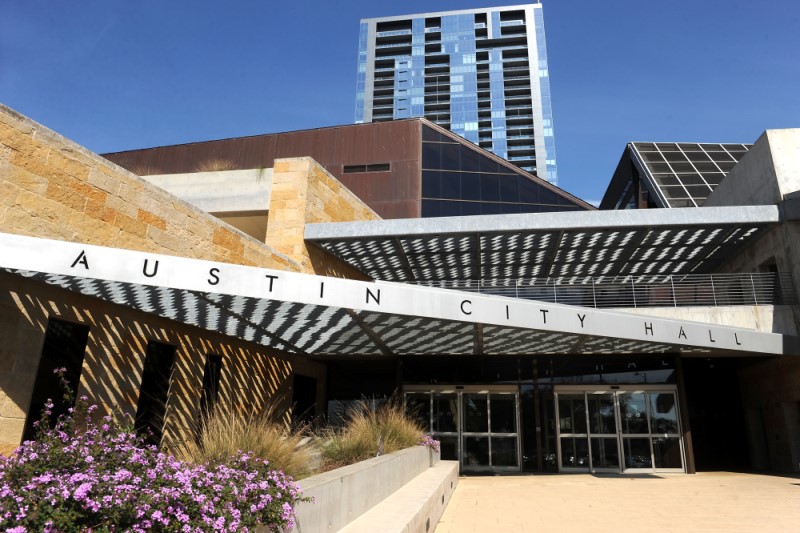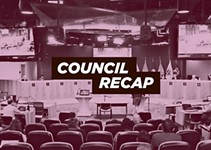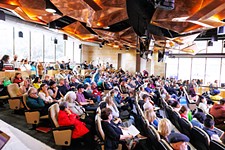City Council Moves Gently on Riverside Redevelopment, Less So on Hotel Occupancy Tax
First meeting after summer break features plenty of theatrics
By Austin Sanders, 2:15PM, Fri. Aug. 9, 2019
City Council gave preliminary approval on Thursday (Aug. 8) to the 97-acre mixed-use redevelopment at 4700 E. Riverside that’s been dubbed the “Domain on Riverside” by its detractors.
The proposal calls for razing five existing apartment complexes that contain about 1,300 housing units; in their place would, over a 10- to 20-year buildout, go 4,700 residential units, 600 hotel rooms, and over 4 million square feet of office and retail space. The case was approved on first reading, 9-2, with Mayor Pro Tem Delia Garza and Council Member Greg Casar voting against. Both cited concerns about displacement caused by tearing down what are currently considered affordable market-rate units. Representing the developer, Armbrust & Brown attorney Michael Whellan talked up the planned relocation package to help displaced tenants pay moving expenses and offer a “right to return” once the new housing units are brought online.
But Casar remained unconvinced the project made sense as a redevelopment in the East Riverside Corridor, rather than a greenfield development elsewhere. Moreover, he argued, the applicant’s requested zoning - an increase in heights over what’s currently allowed in the ERC regulating plan, up to 60 feet - would allow but not require the developers to produce the several hundred subsidized housing units promised for the site, should they opt to forgo the city’s density bonus program. He asked his colleagues for more time to find ways to guarantee that affordable housing will be part of 4700 Riverside, pointing to another large mixed-use infill project – The Grove– which was considered by Council for about six months before passing on all three readings. “If this piece had been somewhere else,” Casar said, “and if we heard people who lived nearby, I have a sense we wouldn’t (approve) it on all three readings.”
D3 CM Pio Renteria, who represents the site and its current residents, was reluctant to delay approval but ultimately agreed to Casar’s motion. Renteria has consistently argued the city needs more housing, now. “We talk about building more housing and more units,” he told his colleagues. “But every time we get to that point, we seem to delay. And the delays are adding up.”
More than five hours before Council took up the case, a group of neighborhood revolutionaries had disrupted the meeting by rushing the dais to voice their disapproval of Riverside redevelopment, to be escorted out by a swarm of APD officers waiting for them. Five were arrested and booked into jail on charges of disrupting a public meeting. Others returned later in the evening – hours after Council had voted on the case – and were again escorted out by APD while chanting the “city process is a sham, we fight back when you steal our land.” In spite of these protests, the zoning case will come back to Council for a second reading on Aug. 22.
As the meeting dragged into Friday morning, Council voted unanimously to raise the city’s Hotel Occupancy Tax (HOT) rate to 9%, the highest allowed under state law. The 2-cent bump in taxes on hotel stays is expected to generate about $20 million in new revenue for the city, which would be earmarked for a proposed expansion of the Neal W. Kocurek Austin Convention Center, estimated to cost $1.2 billion.
Though that project has not been given final approval, it’s been eyed for over a year as a key part of solving Mayor Steve Adler’s “downtown puzzle.” But the move to raise the HOT this soon came as a surprise - and had been added as an emergency measure to the agenda only a few days earlier. The city says it needed to begin banking cash immediately for the future expansion, but the timing raised alarms at Travis County, which had earlier in the week put in motion plans to collect a 2-cent HOT to invest in its Exposition Center; the city’s abrupt action to max out Austin’s combined HOT rate (which does not require voter approval) could make moot the county’s plans to revive the East Austin complex adjoining Walter E. Long Park.
And so, four of the five members of Commissioners Court appeared at City Hall during Thursday’s meeting to make their case: Downtown Austin is already flourishing, and economic impact would be felt much more deeply in the Eastern Crescent - where creating opportunity is a stated goal of both the city and county. Commissioner Jeff Travillion pointed to economic disparities in his Precinct 1, which includes the Expo Center, as partly the result of Downtown’s boom: “We have got to think about how we work with the whole area and not just Downtown,” Travillion told Council, adding that “the people that we have displaced have moved out to (eastern Travis County),” and “(U.S.)183 is becoming what I-35 was for the last generation.”
County Judge Sarah Eckhardt maintained she and her court had no position on the city’s Convention Center plans, but urged Council to consider the “harm” that could come from depriving the county of revenue it can tap for Expo Center reinvestment. At one point, she bluntly asked CM Alison Alter to commit to relinquishing the 2% of HOT that currently services the debt from the 2002 expansion, expected to be paid off by 2021. Alter declined, noting that Council has only received a rough estimate of the proposed expansion’s cost, as part of the study conducted by the UT School of Architecture.
This afternoon (Friday), Eckhardt issued a statement reinforcing the commissioners’ comments the day before, “The City Council suggested that [its 2% HOT increase] ‘increases the probabilities’ of the City paying down its current debt,” but “Travis County is not asking the City for increased probabilities. Travis County is asking for a commitment to East Austin by a date certain” - 2021 - “so that meaningful investment can be made in the Exposition Center and East Austin.”
In other Convention Center news, Council finalized language for the ballot measure - Proposition B this November - brought forth by expansion opponents, and the Unconventional Austin PAC officially has its rival, the PHAM PAC, which launched Thursday morning before the Council meeting began. Language for Prop A, which would require a citywide vote to approve private lease of city-owned land – spawned by foes of the Austin FC deal at McKalla Place – was also approved early Friday morning.
City Council also gave unanimous approval to two ambitious, if largely symbolic, resolutions: one to declare a “climate emergency” citywide, and another to call on state and federal elected officials to step up and take action on reducing gun violence in the United States. Both will be followed in future weeks by more specific directives from Council to address these issues locally.
A fairly innocuous item to create a local government corporation aimed at fundraising for solutions to homelessness was pulled from the consent agenda to give opponents of Council’s June votes to decriminalize sitting, lying, or camping in public an opportunity to grandstand on the issue. A testy exchange between Travis County GOP chair Matt Mackowiak and Casar followed, as Mackowiak claimed, without evidence, that the ordinance changes resulted in an increase in “human waste” on the city’s streets. A clearly frustrated Casar pushed back on this claim: “Where was it happening in June? Was it happening in the homes [people] don’t have?” Mackowiak eventually conceded that waste hasn’t increased, “but it’s happening in ways that is unavoidable for people trying to go about their daily lives.” Imagine how those without regular access to bathrooms or trash bags feel.
Got something to say on the subject? Send a letter to the editor.
A note to readers: Bold and uncensored, The Austin Chronicle has been Austin’s independent news source for over 40 years, expressing the community’s political and environmental concerns and supporting its active cultural scene. Now more than ever, we need your support to continue supplying Austin with independent, free press. If real news is important to you, please consider making a donation of $5, $10 or whatever you can afford, to help keep our journalism on stands.
Austin Sanders, Feb. 6, 2023
Lina Fisher, Dec. 9, 2022
April 19, 2024
April 19, 2024
Austin City Council, City Council, Steve Adler, Greg Casar, Pio Renteria, Alison Alter, Matt Mackowiak, Michael Whellan, Travis County Commissioners Court, Sarah Eckhardt, Jeff Travillion, Hotel Occupancy Tax, Convention Center, Exposition Center, Unconventional Austin, PHAM PAC, November 2019 Election











